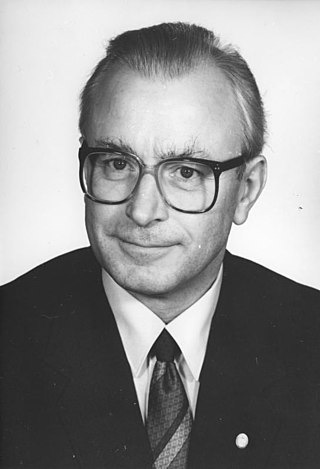
Friedrich Wilhelm Reinhold Pieck was a German communist politician who served as the chairman of the Socialist Unity Party from 1946 to 1950 and as the only president of the German Democratic Republic from 1949 until his death in 1960.

Wolfgang Schwanitz was a German intelligence official, who was the last head of the Stasi, the East German secret police. It was officially renamed the "Office for National Security" on 17 November 1989. Unlike his predecessor, Erich Mielke, he did not hold the title "Minister of State Security", but held the title of "Leader of the Office for National Security". Following the German reunification, he was active as an author of works that sought to portray the Stasi in a positive light.

Kurt Wünsche was a German politician who was twice Minister of Justice of the German Democratic Republic.
An unofficial collaborator or IM, or euphemistically informal collaborator, was an informant in the German Democratic Republic who delivered private information to the Ministry for State Security. At the end of the East German government, there was a network of around 189,000 informants, working at every level of society.
Jens Gieseke is a German historian. His work is focused on the German Democratic Republic and its Ministry for State Security.
Ilko-Sascha Kowalczuk is a German historian and author. His work is focused on the German Democratic Republic and its Ministry for State Security.

Thomas Ammer was a German historian who as a young man studied to become a physician. He was arrested and imprisoned in 1958 for anti-government political activism in East Germany and he never qualified as a medical doctor. His 15-year prison sentence was cut short in August 1964 when his release was purchased by the West German government, and at the age of 27 he relocated to the German Federal Republic.
Andreas Herbst is a German historian. His career has been divided between authorship and museum work. He has written extensively on aspects of the German Democratic Republic and since 2001 has worked for the German Resistance Memorial Center in Berlin.
Horst Bartel was a German historian and university professor. He was involved in most of the core historiography projects undertaken in the German Democratic Republic (1949–1989). His work on the nineteenth-century German Labour movement places him firmly in the mainstream tradition of Marxist–Leninist historical interpretation.
Manfred Döring was a Major general (Generalmajor) with the East German Ministry for State Security (Stasi). He also served, between 1987 and 1990, as a commander of the elite motorised rifles regiment, the Felix Dzerzhinsky Guards.
Ehrhart Neubert was a German evangelical minister and theologian.

Thomas Kuczynski was a German statistician and economist.
Hans Mottek was one of the most important economic historians of the DDR.
Marlies Deneke is a German politician.
Irene Runge is an American-German-Jewish sociologist, writer and commentator.
Günter Heyden was a German professor of philosophy and a sociologist. Between 1969 and 1989 he was the director of the East Berlin basedInstitute for Marxism–Leninism.
Bernhard Elsner was a Major general in the East German Ministry for State Security (Stasi). During the course of a long career with the quasi-military ministry, between 1972 and 1987 he was Commander of the Felix Dzerzhinsky Guards Regiment.
Christa Schmidt is a retired German politician (CDU). She served as a minister in the last government of East Germany. She had built an earlier career as a teacher and educationalist.

Stephan Krawczyk is a German writer and songwriter. Before 1989 he was a noted East German dissident.
Georg Friedrich Alexan was a Jewish German journalist, best remembered as the editor-in-chief of the East German newspaper USA in Wort und Bild.






